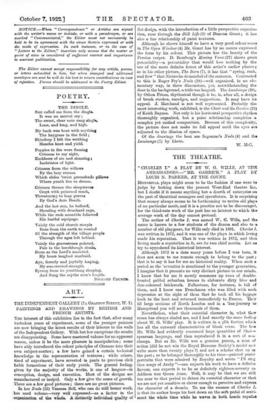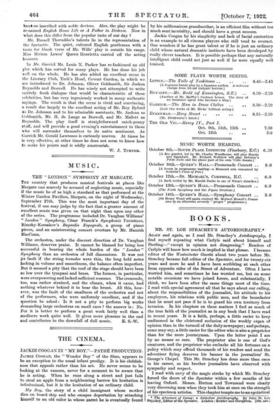THE THEATRE.
"CHARLES L" A PLAY BY W. G. WILLS, AT THE AMBASSADORS.—" AIR. GARRICK." A PLAY 13? LOUIS N. PARKER, AT THE COURT.
IiisTomeAL plays might seem to be the fashion if one were to judge by looking down the present West-End theatre list, but I doubt if it means anything but a dearth of enterprise on the part of theatrical managers and speculators. It is surprising that money always seems to be forthcoming to revive old plays of no particular merit, and It is a practice not to be discouraged, for the third-rate work of the past has an interest to which the average work of the day cannot pretend.
The author of Charles I. was named W. G. Wills, and the name is known to a few students of the drama and also to a number of old playgoers, for Wills only died in 1891. Charles 1. was written in 1872, and it was one of the plays in which Irving made his reputation. That it was written in 1872, and that Irving made a reputation in it, are its two chief merits. Let us try to apprehend its historical interest.
Although 1872 is a date many years before I was born, it does not seem to me remote enough to belong to the past ; that is to say it has for me no historical reality. When such a period as the 'seventies is mentioned to the younger generation. I imagine that it presents no very distinct picture to our minds. I know that for me it merely summons up rows of double. fronted gabled suburban houses in elaborate dirty blue and dun-coloured brickwork. Folkestone, for instance, is full of them, and I know one Frenchman who was filled with such depression at the sight of them that he took all his luggve back to the boat and returned immediately to France. 11,7 fill large sections of North London and in a. 'bus-journey to Hampstead you will see thousands of them.
Nevertheless, what their essential character is, what they
mean has always eluded me, and I had exactly the same feelirl about W. G. Wills' play. It is written in a glib fustian which has all the outward characteristics of blank verse. The le te
Mr. Wills had evidently consumed large quantities of Shell "- spearean language, and then reproduced it in a sort of see.
change. But as Mr. Wills was a genuine person, a man of
action (did he not win the Royal Humane Society's medal and write more than twenty plays ?) and not a scholar shut up in the past ; as he belonged thoroughly to his time—painted pastel
portraits that were admired by Royalty and wrote "I'll sing thee songs of Araby "—one expects his work to have a definite
flavour, one expects it to be as definitely eighteen-seventy as Addison was Queen Anne. Well, it may be that we arc still too near to that period to detect its essential character or that
we are not yet sensitive or clever enough to perceive and express the character of a decade. To me the essence of Charles I. is that its author keeps his foot down on the soft pedal of senti- ment the whole time while he waves in both hands royalist ban_urs inscribed with noble devices. Also, the play might be re-named English Home Life or A Father in Distress. Now in what does this differ from the popular taste of our day ?
Mr. Russell Thorndike's talents lie in the representation of the fantastic. The quiet, cultured English gentleman with a taste for blank verse of Mr. Wills' play is outside his range. Miss Miriam Lewes' Queen Henrietta carried off the acting honours.
In Mr. Garrick Mr. Louis N. Parker has re-fashioned an old plot which has served for many plays. He has done his job well on the whole. He has also added an excellent scene in the Literary Club, Turk's Head, Covent Garden, in which we are introduced to Dr. Johnson, Oliver Goldsmith, Sir Joshua Reynolds and Boswell. He has wisely not attempted to write entirely fresh dialogue that would be characteristic of these celebrities, but has very ingeniously worked in many authentic sayings. The result is that the scene is vivid and convincing, a result due largely to the excellent acting of Mr. Roy Byford as Dr. Johnson and to his admirable assistants, Mr. Andean as Goldsmith, Mr. H. de Lange as Boswell, and Mr. Mallett as Reynolds. The play itself is straightforward catch-penny stuff, and will provide a good evening's entertainment to those who will surrender themselves to its naive sentiment. As Garrick Mr. Gerald Lawrence is curiously uneven. At times he is very effective, at other times he does not seem to know how to make his points and is oddly amateurish.
W. J. TURNER.







































 Previous page
Previous page